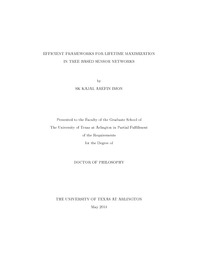
ATTENTION: The works hosted here are being migrated to a new repository that will consolidate resources, improve discoverability, and better show UTA's research impact on the global community. We will update authors as the migration progresses. Please see MavMatrix for more information.
Show simple item record
| dc.contributor.author | Imon, Sk Kajal Arefin | |
| dc.date.accessioned | 2017-05-31T19:22:31Z | |
| dc.date.available | 2017-05-31T19:22:31Z | |
| dc.date.submitted | January 2014 | |
| dc.identifier.other | DISS-12553 | |
| dc.identifier.uri | http://hdl.handle.net/10106/26667 | |
| dc.description.abstract | In most wireless sensor network (WSN) applications, data are typically gathered by the sensor nodes and reported to a data collection point, called the sink. In order to support such data collection, a tree structure rooted at the sink is usually defined. Based on different aspects, including the actual WSN topology and the available energy budget, the energy consumption of nodes belonging to different paths in the data collection tree may vary significantly. This affects the overall network lifetime, defined in terms of when the first node in the network runs out of energy. In this thesis, we address the problem of lifetime maximization of WSNs in the context of data collection trees through load balancing and data compression techniques. From load balancing perspective, we propose a novel and efficient algorithm, called Randomized Switching for Maximizing Lifetime (RaSMaLai) that intelligently changes the path (toward the sink) of sensors to distribute traffic load. We analytically show that, under appropriate settings of the operating parameters, RaSMaLai converges with a low time complexity. We further design a distributed version of our algorithm, called D-RaSMaLai. While D-RaSMaLai works on the same principals of RaSMaLai, the design of the distributed version is novel and energy efficient. Simulation results show that both the proposed algorithms outperform several existing approaches in terms of network lifetime.We also approach the lifetime maximization problem leveraging compression of sensor data streams. Compression of correlated data is one of the widely used techniques where the amount of transmitted data is minimized along their routes towards the sink. Existing works in this direction do not consider the temporal effect of correlation among data streams generated by periodic sensing. Moreover, the compression can introduce some imperfection that may affect the reliability of the collected data. In this thesis, we address the problem of energy efficient data gathering in WSNs while considering variability of correlation among data streams of neighboring sensors. We perform experiments on real data sets and show that our framework is very energy efficient, and contributes to lifetime maximization. | |
| dc.description.sponsorship | Wright, Matthew | |
| dc.language.iso | en | |
| dc.publisher | Computer Science & Engineering | |
| dc.title | Efficient Frameworks For Lifetime Maximization In Tree Based Sensor Networks | |
| dc.type | Ph.D. | |
| dc.contributor.committeeChair | Wright, Matthew | |
| dc.degree.department | Computer Science & Engineering | |
| dc.degree.discipline | Computer Science & Engineering | |
| dc.degree.grantor | University of Texas at Arlington | |
| dc.degree.level | doctoral | |
| dc.degree.name | Ph.D. | |
Files in this item
- Name:
- IMON_uta_2502D_12553.pdf
- Size:
- 2.495Mb
- Format:
- PDF
This item appears in the following Collection(s)
Show simple item record


